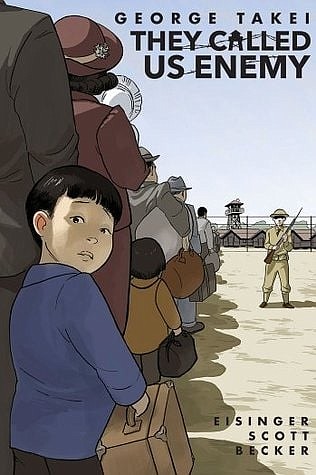George Takei is, at this point in history, more or less a household name.
Whether it's because of his role as Hikaru Sulu on "Star Trek," his LGBTQ+ activism or his strong social media presence, he's a force to be reckoned with.
What many don't know is George's family was one of thousands of Japanese-American families who were ripped from their homes and placed into camps across the United States in the 1940s.
"They Called Us Enemy" is a graphic novel memoir detailing the time George's family spent being forced to live in these camps.
Born and raised in Los Angeles, George's life began like so many other American children and, like so many other Americans, his life was forever changed by the bombing of Pearl Harbor. In 1942, President Franklin D. Roosevelt signed an order to round up those of Japanese ancestry and place them into "relocation camps." It didn't matter if the individual in question was a U.S. citizen; they were now officially considered an enemy of the United States and stripped of their rights, property and had their finances frozen.
The Takei family lost everything they had worked so hard to build.
In "They Called Us Enemy," readers get a first-hand glimpse at what life was like in the internment camps and will be moved at the lengths George's parents went through to keep their young family thriving in the face of hostility and imprisonment. No matter how bad things got, George's parents did everything they could to shield their children from the worst of what their awful circumstances had to offer and never gave up the hope their children would be able to live out their American dream.
For many years, this particular low point in American history has been glossed over or entirely untold. Now, with the help of writers Justin Eisinger and Steven Scott, as well as artist Harmony Becker, Takei's first-hand account makes accessible an important chapter of history to a wide variety of readers. The narrative alternates between the perspective of George as a child, largely naive to the implications of his family's circumstances, and commentary from George as an adult, now fully cognizant of the broader picture.
Becker's illustrations are clear, detailed and evocative, deftly capturing the emotional weight of the narrative. "They Called Us Enemy" is poised to join the pantheon of great graphic memoirs like "Maus" and "Persepolis." It's one of the most heavily hyped graphic novels of the year, and fortunately, it lives up to its promise. Simultaneously educational and moving, "They Called Us Enemy" is a must-read for teens and adults alike.
Courtney Waters is the teen services manager at the Missouri River Regional Library.

